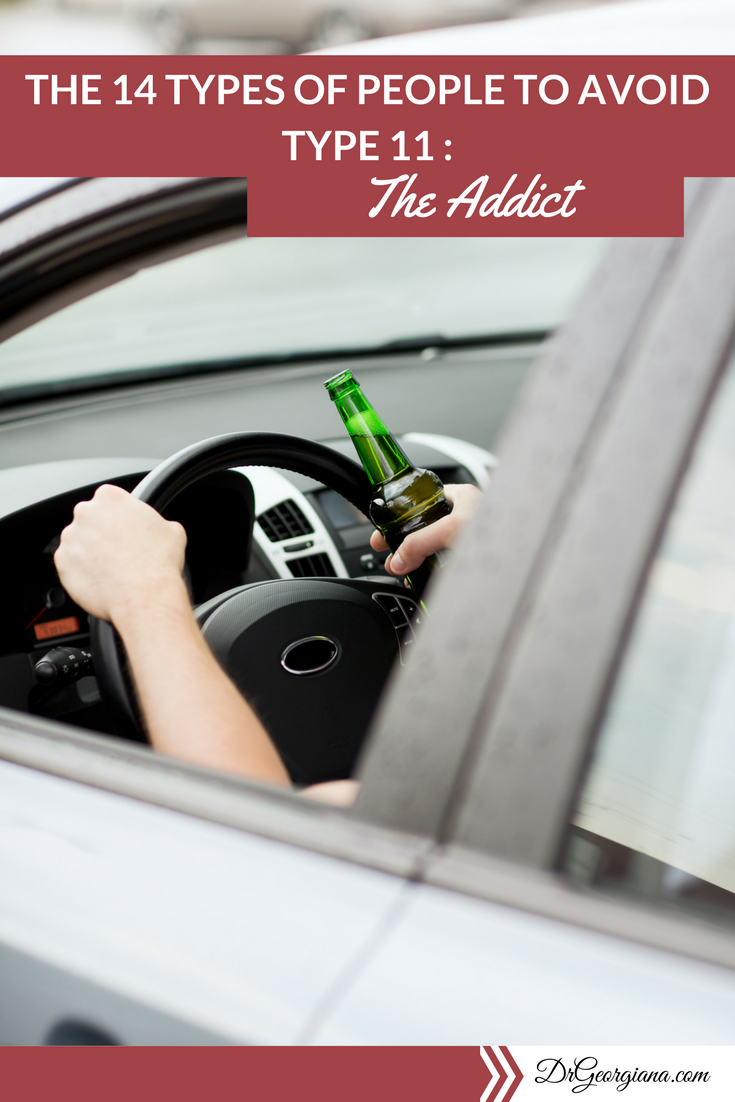
Are there people in your personal or professional life who have traits or behaviors that you consider unhealthy? If so, do you wish you would have known how to spot them sooner?
Welcome to the Dr. Georgiana Relationship Series: “The 14 Types of People To Avoid”. In my previous segment, I pointed out many of the characteristics of The Angry individual that can bring emotional unrest to your life. In this segment, I am going discuss The Addicted Person.
I am presenting this segment in answer to an email I received from Alex from Charlotte, North Carolina with the following question:
“Dear Dr. Georgiana,
Jane and I have been married for 2 years and overall we have had a great relationship. When we met, we both liked to party and have fun but it was never out of control or excessive. After our baby girl, who is now 3 years old was born, I gave up drinking and smoking altogether and have been taking good care of my health. Unfortunately, Jane is not doing as well. Her father died 6 months ago and she took it really hard. She has been very anxious and restless and has begun to drink hard liquor again (which she had given up also when she became pregnant). The other day, I was checking our joint bank account and found that she had made several payments to a company I did not recognize. Because it was quite a bit of money, I asked her about it and she responded evasively basically saying that it was none of my business. That made me suspicious and pre-occupied so I did a little research and found out that it was a gambling outfit based in Nevada. Apparently, she has been gambling for a while and never said anything to me about it. I understand that she is still in pain about her father’s death but I am concerned that her behavior might not just be a passing phase. Because she doesn’t want to talk about it, I don’t know what to do. Could you please advise me?”
Alex, what you are telling me is worrisome. I see 3 issues here: The first one is Jane’s grieving of her father’s passing, the second one is the substance abuse and the third is her gambling addiction.
Although it is common for people who are grieving to have less control over their impulses, it could also be that Jane has an issue with impulse control that is separate from the grieving and that will not be likely to pass unless addressed. It is important for Jane to learn to grieve without the use of substances, as this will delay the process and make it impossible for her to get past it.
For this, she would need to recognize that she is escaping her feelings and trying to avoid facing the death of her father. This may be your opening, as it will be easier for her to accept help for her sorrow than for an alcohol or gambling addiction. I suggest that you discuss with her going to see a family therapist. If she agrees, you could bring up your full concern in the therapist’ office so that you get some backing. If she does not agree to go, then you may need to tell her that you have discovered that she is gambling. If this still does not do it, then I would engage her family of origin or anyone in her life with influence to make an intervention.
As you probably know, having a child and lacking control over a substance presents a problem. You need to assess whether your 3-year-old daughter is at risk. If she is, then you must act to protect her. As a parent of a young child, Jane will be in contact with other people’s children and if she is drinking, it can put these children at risk. She could also be drinking and driving and this can put her and your child in danger.
The gambling issue is no less problematic. If your accounts are joined, over drinking and gambling can wipe out your financial resources. I suggest that you review your bank accounts thoroughly in order to assess the extent of the problem. You may need to exercise some tough love in order to protect her and you from the gambling addiction.
These 3 issues are not easy to resolve and you will need support. If you do not end up getting her cooperation and hiring a family therapist, you could benefit from an individual therapist to help you personally navigate these challenges.
Alex, I want to thank you for sharing your experience with me and giving me an opportunity to advise you. To everyone following the series, I am honored to be part of your journey to find the right partner. I look forward to sharing future articles with you, connecting in one of my online relationship programs, or having a personalized Relationship Coaching session.
If you have been successful at spotting unhealthy people, in particular an addicted person, before they created too much pain in your life, please share your wisdom in the comments’ section below or on my Facebook page. You can see the answer to many of my subscriber’s questions and be notified when I post new articles by signing up to receive my online news bulletin at www.drgeorgiana.com.
ABOUT THE AUTHOR
Author Georgiana Spradling, Ph.D., MFT, CDVC, is a multicultural and multilingual (English, Spanish, & French) Emotional Intelligence Relationship Coach with over 20 years of experience helping people choose the right partners and avoid the wrong ones, manage emotions and behaviors in self and others, leave unhealthy partnerships, and move past old relationships. She is a Certified Domestic Violence Counselor and has a Certificate as an Anger Management Facilitator. Her e-book: “Don’t Get Stuck with the Wrong Partner: Learn to Detect Unhealthy Traits and Behaviors in Others” is available on the Amazon Kindle. You can subscribe to her videos on the undesirable sides of dating, committed relationships, separation and divorce on her YouTube Page.
Dr. Georgiana coaches on the telephone, online or in her office in San Francisco (USA) and offers a FREE 25-minute Consultation. She can be reached through her website: www.drgeorgiana.com, by e-mail: gs@drgeorgiana.com or phone: 1-650-731-5105.
